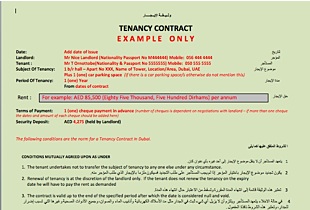Guides
Article

Advice on Dubai Residential Tenancy Contracts
We all need one but do we know what to look for when we sign a Dubai Tenancy Contract. See the full article for the do's and don'ts.

Cheque Dates
Number of Cheques – Rentals in Dubai are paid by bank cheques. Depending on your agreement with the Landlord/Agent you may be required to pay the full annual rent in advance (one cheque per annum), biannually (two cheques per annum) etc. It is unusual for Landlords/Agents to accept more than six cheques. Remember to cross all cheques issued to ensure that the money is going into the bank account of the Landlord or the official Landlord’s representative which would require a letter signed by the Landlord stating that this is the case. To cross a cheque you simply mark two small lines diagonally across the left hand corner of the cheque.
A year or so ago, when times were tough landlords/agents were allowing between 4 and 6 cheques and there was talk of even 12 cheques nowadays a number of property adverts state ‘one cheque’.
This means you need to have this amount of money available at the beginning of the lease. The good thing is that you can forget about paying rent for one year but not everyone has this amount of available cash. If you don’t want to issue one cheque look for alternative properties or negotiate hard with the Landlord/Agent who will often add a few thousand dirhams onto the annual rent if they agree to accept more than one cheque.
One year can be a very short time.
Keep the Landlord informed of your intentions
A great relationship is one where mutual respect and honesty are paramount and this can be said for the Landlord/Tenancy arrangement.
Most Tenancy Contracts are for one year. Ignore the words ‘non negotiable’ on these contracts – they cannot be upheld in Dubai.
If you want to stay for a further year then you do not need to inform the Landlord/Agent but to ensure that there are no misunderstandings it is often best to communicate your intentions to the Landlord/Agent by way of a written document. If the Tenancy Contract is not renewed at the time of the lease expiry then the contract is deemed to continue through the next year on exactly the same terms as the previous year.
If the Landlord wishes to increase your rent then he needs to give you 90 days’ written notice. Always check that the increase is in line with the RERA Rental Calculator.
If you wish to leave the property you need to give the Landlord/Agent at least 3 months’ notice, depending on the wording of your contract. The letter should state that you will vacate the property at the expiry of the contract. To ensure that there are no comebacks make sure that the letter is sent by courier (and therefore a signature is required on delivery) to the appropriate party. The contact details of the Landlord may be provided in the Tenancy Contract but ensure that you have a delivery address for the Landlord/Agent at the beginning of the Lease. Ask the courier company to provide you with a copy of the signature for the receipt of paperwork.
Nasty little practice
In 2012 and 2013 we saw the greed factor setting in (again)!
Landlords were issuing notices to Tenants (often immediately after they had signed the year long Tenancy Contract) to move out at the expiry of the first year of the Tenancy Contract. Tenants often took these at face value, not questioning the legality behind them.
This is another practice you should not accept – the Landlord issues a ‘vacating letter’ asking you to sign it. DO NOT. It is completely unnecessary. Some tenants complain and say that their landlord is a particular nationality and they don’t want any trouble. Be strong. The system is there to protect you and your rights. If you have any queries contact us and we’ll point you in the right direction.
You will be delighted to hear that strict guidelines are in place in RERA and the Land Department stating that if a Landlord wishes the Tenancy Contract to vacate the property there are procedures in place which must be followed otherwise any vacating letter provided by the Landlord is deemed null and void.
Your landlord is required, by law, to give you at least 12 months’ notice to vacate the property. The request must be in writing and sent via a notary public or registered mail or courier. A signature showing receipt by the Tenant is required.
There are four reasons why a landlord may need to repossess a property upon expiry of a tenancy contract:
- The Landlord is going to use the property for his personal use (or that of an immediate next of kin, i.e. family), however, he needs to prove that he does not own any other alternative property which could be used. If a landlord says they need to take back possession of a property for this reason and you find out after you have moved out that it has been re-let, you will be entitled to compensation. Landlords are not allowed to re-let for a period of two years from eviction for residential properties and three years for non-residential.
- If the owner needs to demolish the property for reconstruction or to add a new extension that prevents the tenant from living at the property.
- If the owner wishes to sell. This is the most common cause, though that should not be the case. Yes, a property can go on sale immediately (within reason), but the seller is required give the tenant at least 12 months’ notice to vacate. This makes it unlikely that the new owner will be an owner-occupier. Most people would not wait a year to move in. The new buyer is likely to be an investor-landlord. You should be able to renegotiate your lease agreement with them and perhaps end up staying after all.
- If the property requires extensive modernisation and upgrading during which time the property would be deemed uninhabitable.
If the property is sold and you find yourself with a new Landlord invite him/her to meet your family, so you can explain your needs as tenants and he/she can see how well you have looked after the property. Hopefully if your new Landlord is an owner/investor then he/she will be interested in having reliable tenant, one that keeps the property in good condition and pays the rent on time.
As part of the renewal process a new Tenancy Contract should be drawn up for the next year. If you’re using a Real Estate Broker to renew the contract they will charge you a fee. Check your initial contract (usually in the Addendum) which states the charge. RERA did mention a fee of AED 160 but no-one seems to stick to this amount and it is usually around AED 500. If it isn’t on the contract then you shouldn’t need to pay any more than AED 160.
Always get receipts for all payments. If you are paying by cheques take photocopies of the cheques and ask the Landlord or Agent (depending on the circumstances) to sign and date as being received by them.
Remember, you will need to organise Ejari for the new contract. DEWA is ongoing.
The advice provided in our columns does not constitute legal advice and is provided for information only. Readers are encouraged to seek appropriate independent legal advice.
We know it's kinda boring but the Copyright and Disclaimer are important...have a read
« Back to Dubai Sherpas

Tell us your story
We're all ears. Your story is important so let's hear how you survived Dubai.
Submit your story
Dubai Sherpas
Sherpas look, listen, learn, do and then share so that you can do, easily.
View GuidesA great place to live and a great place to work. If you're thinking of setting up a business in Dubai, you've come to the right place. Information can be provided on all aspects of business incorporation in Dubai. Contact us now.
Newsletter
Interested in hearing more about surviving in Dubai?
Please enter your email below.
We do not send spam emails or share your details with any third party.

